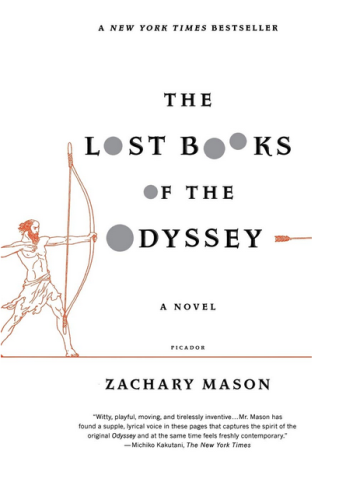Review: Zachary Mason - THE LOST BOOKS OF THE ODYSSEY
Zachary Mason's The Lost Books of The Odyssey isn't a novel or a collection of short stories, but exactly what its preface promises: a series of “concise variations on Odysseus's story that omit stock epic formulae in favor of honing a single trope or image down to an extreme of clarity.” This is more exciting than it sounds. In texts ranging in length from a paragraph to twenty pages, we get Odysseus deserting the Trojan War; Odysseus turning to piracy on his way home; Athena offering herself to Odysseus; Paris turning out to be Death itself; Achilles indifferently killing all of the Gods; Telemachus setting out to sea.
The table of contents lists forty-four of these post-modern riffs, but the book performs a forty-fifth: deft yet reckless, inspired as frequently as it is contrived, usually coolly intellectual, though sporadically sentimental, and at all times very, very sly, it is the kind of book Odysseus might have written.The fourteenth story, “A Fragment,” is the shortest of the various Odysseys Mason conceives, but everything captivating and frustrating about the others is in it:
Odysseus, finding that his reputation for trickery preceded him, started inventing histories for himself and disseminating them wherever he went. This had the intended effect of clouding perception and distorting expectation, making it easier for him to work as he was wont, and the unexpected effect that one of his lies became, with minor variations, the Odyssey of Homer.
Quite a chill comes from this swift paragraph. Not only is the West's founding text discounted as one of several lies; a disconcerting Odysseus lurks beneath these words. What work is it, exactly, that this Odysseus is wont to do? What is the Odyssey covering up? As in the best of fictions of Borges or Kafka, we're left wanting answers to questions the text only very subtly suggests, and we're told just enough to imagine – or believe we can imagine – those answers for ourselves.
About a dozen of the stories pull off this effect: lines of controlled, lucid prose lead to a conclusion that is viscerally unsettling. “A Night in the Woods” tells of Odysseus returning to Ithaca and easily reclaiming his throne, as Penelope has taken care of the suitors herself – but it leaves us with the suspicion that Odysseus does not know his wife, or his son, at all. “Islands on the Way” describes Odysseus and his men giving up, settling on an arbitrary island and beginning new lives, but ends with an escape back into the night that is as suspenseful as it is strange. “Alexander's Odyssey” portrays Alexander the Great's attempt to live like Achilles, and his hollowing, deathbed epiphany that he has failed. And “Blindness” does far more than imagine the Cyclops episode as the Cyclops experienced it: after receiving his wound the giant, helpless to take revenge, dreams of Odysseus's further trials at sea, and before he or we quite realize it, he has become the author of an epic – an idea that becomes still more disquieting when we remember that, according to legend, Homer was blind.
Yet, like the short “A Fragment,” nearly all of the stories calmly draw you along, to at the very end pull the rug out from under your feet. By the time I was mid-way through the book, I was reading each story quickly – too quickly, hastily – because I was anticipating a twist or unexpected step in the final few sentences. As there are forty-four stories, and many of them end a little too cryptically, this gets exhausting. And as each of the stories is essentially self-contained, themes and images don't develop from one to the next, so much as repeat, and the book itself never gains momentum.It's worth making your way through The Lost Books of the Odyssey to find the best stories in it. But your sense grows that Mason is simply playing one trick after another. If we put up with Odysseus's cunning, it's because he was going somewhere.
Zachary Mason is a computer scientist specializing in artificial intelligence. He was a finalist for the 2009 New York Publish Library Young Lions Fiction Award. The Lost Books of the Odyssey is his first book.
